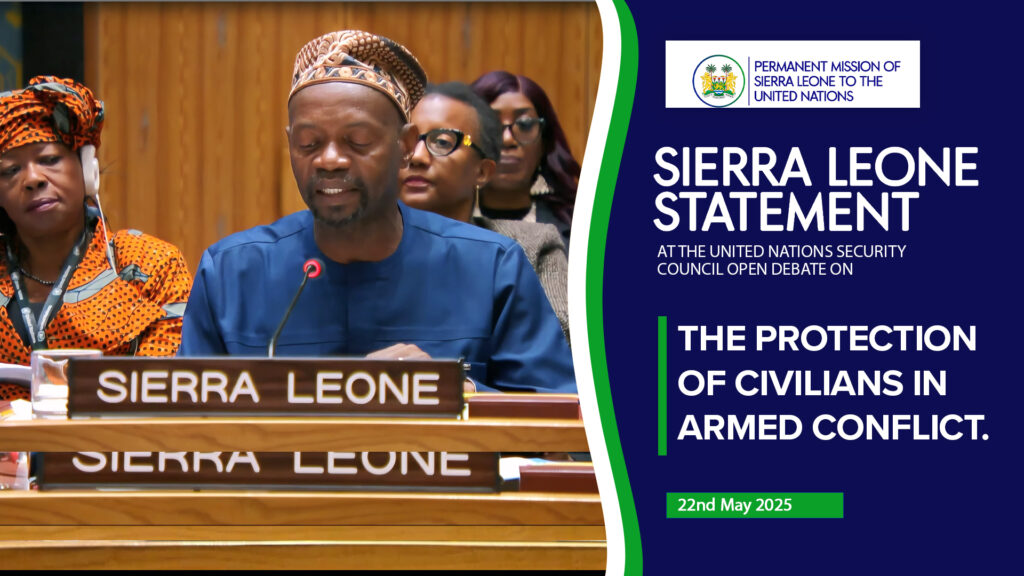STATEMENT BY
H.E. MR. KALILU IBRAHIM TOTANGI
AMBASSADOR AND DEPUTY PERMANENT REPRESENTATIVE / CHARGÉ D’AFFAIRES a.i.
Thank you, Mr. President, Your Excellency Mr. George Gerapetritis, Minister for Foreign Affairs of Greece.
I warmly welcome you to the Security Council and thank you for convening this important open debate.
I also thank Under-Secretary-General Tom Fletcher, Under-Secretary-General and Executive Director of UN Women Ms. Sima Bahous, ICRC President Ms. Mirjana Spoljaric Egger, for their important and sobering briefings. I take note of the contribution of Ms. Janti Soeripto of Save the Children.
Sierra Leone reaffirms its unwavering commitment to the protection of civilians in armed conflict, grounded in international humanitarian law (IHL) and international human rights law. As co-chair of Workstream 4 on Protecting Civilian Infrastructure under the Global Initiative launched in September 2024 by Brazil, China, France, Jordan, Kazakhstan, South Africa, and the ICRC, Sierra Leone is advancing practical recommendations for safeguarding civilians and essential infrastructure in conflict zones.
This Council first authorized a protection of civilians mandate in Resolution 1270 (1999), establishing the United Nations Mission in Sierra Leone (UNAMSIL). Yet, more than two decades on, civilians continue to suffer the gravest consequences of conflict, despite the Council’s consistent efforts.
Mr. President,
The Secretary-General’s 2025 report underscores the devastating impact of over 120 ongoing conflicts globally. Civilian casualties remain unacceptably high, particularly due to the use of improvised explosive devices and wide-area effect weapons in densely populated areas.
We are deeply alarmed by the 4,500 reported cases of conflict-related sexual violence in 2024, 93% of which affected women and girls. Survivors often face insurmountable barriers to healthcare, legal redress, and psychosocial support. The emergence of digital threats such as doxing and sexualized cyber-violence only compounds these risks.
Sierra Leone categorically condemns the militarization of health and educational facilities. Using hospitals or schools for military purposes places civilians, including patients, pupils, students, and staff, in grave danger and undermines access to essential services. We are especially concerned about the continued recruitment and use of children in armed conflict.
Based on our commitment to the Climate, Peace and Security Agenda, we must highlight the growing nexus between conflict, climate shocks, and food insecurity. In conflict situations such as eastern DRC, Haiti, Palestine, Sudan, and parts of West Africa and the Sahel, these compounded crises are displacing millions and destabilizing entire communities resulting from the intersection of conflict, climate change as well as food insecurity.
Mr. President,
In turning to the theme for today’s debate, Sierra Leone strongly condemn the alarming surge in attacks on humanitarian personnel. With over 360 aid workers killed in 2024, it marked the deadliest year for humanitarian staff. We reaffirm our support for Resolution 2730 (2024) and stress that such attacks are war crimes. Perpetrators must be held accountable. We also call for the unconditional release of all humanitarian personnel unlawfully detained.
Equally disturbing is the targeted killing of journalists. Of the 82 journalists killed in 2024, 53 were in conflict-affected areas. As a signatory to the Global Pledge on Media Freedom, Sierra Leone urges all parties to conflicts to respect IHL and protect journalists and media professionals. We also call on states to adopt robust national frameworks that safeguard journalistic independence and integrity.
To address impunity and systematic violations of IHL, Sierra Leone supports the “full protection of civilians” approach outlined in the Secretary-General’s report. Peacekeeping operations must be authorized with robust mandates prioritizing the safety of civilians, ensuring humanitarian access, and supporting the protection of displaced populations, especially women, children, persons with disabilities, and other vulnerable groups.
Effective protection mandates should be supported by capacity-building, especially in IHL and protection protocols for peacekeepers and community actors. We further propose a strengthened monitoring system to track implementation of Security Council resolutions on protection of civilians, thereby enabling states to develop and refine legal and institutional frameworks at the national and regional levels.
From a regional perspective, we commend the African Union for its normative and operational contributions to the protection of civilians. The AU’s Continental Early Warning System, the African Standby Force, and the adoption of the African Union Policy Framework on Post-Conflict Reconstruction and Development are critical tools. The different iterations of the AU Mission in Somalia (AMISOM/ATMIS/AUSSOM), with a strong POC component, has demonstrated the viability of regional approaches to civilian protection. The AU’s coordination with ECOWAS, IGAD, and other subregional bodies has further amplified efforts to respond swiftly to emerging crises.
We believe that deeper UN-AU cooperation, anchored in Chapter VIII of the UN Charter, is vital to translating early warnings into early action. Enhancing African-led peace support operations, supported by predictable and sustainable financing, will strengthen our collective capacity to protect civilians where it matters most.
Let me close, Mr. President, by affirming unequivocally that the protection of civilians in armed conflicts is not only a legal and moral imperative, but also the cornerstone of lasting peace. Sierra Leone reiterates its deep commitment to conflict prevention, peacekeeping, and peacebuilding. The Pact for the Future rightly calls for strengthened efforts to protect civilians, and we stand ready to support that call, ensuring that no one caught in conflict is forgotten or left behind.
I thank you.



